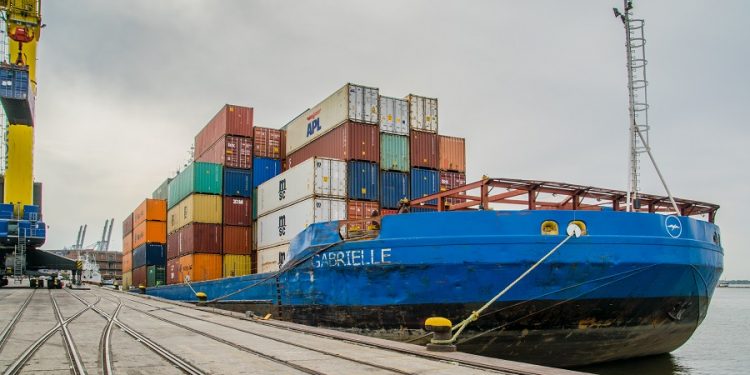Can the global shipping industry chart a path to decarbonisation?
As environmental concerns become increasingly pressing for governments and businesses alike, the shipping industry is taking steps to reduce its carbon footprint.
In late August Danish shipping company Maersk, the world’s largest container shipping line, announced that it had invested $1.4bn in eight new vessels that will be powered by methanol rather than oil-based fuels.
The ships, set to be delivered in 2024, represent 3% of the company’s total container capacity. They will replace older ships in the fleet and are expected to save up to 1m tonnes of carbon dioxide per year.
Under the terms of the deal with South Korean manufacturer Hyundai Heavy Industries, Maersk has the option to secure four more ships in 2025.
The decision represents the latest step in Maersk’s efforts to improve its environmental footprint.
In February the company said that its newbuild vessels would be able to use carbon-neutral fuels, and that a new, smaller container vessel capable of running on clean versions of methanol is expected to be operational by 2023.
Aside from exploring new sources of fuel, the company has implemented a series of engineering upgrades to improve the efficiency of its fleet.
In 2013 Maersk undertook a programme of retrofitting its container ships. This included a “nose job” on 12 of its New Panamax vessels, whereby a ship’s bulbous bow was replaced for a more streamlined design, as well as the implementation of a new propeller and propeller boss cap fin.
The changes helped to reduce fuel emissions by more than 10%, and also led to unexpected benefits with regard to sound pollution.
The new designs resulted in a 6- to 8-decibel reduction in sound pressure, which translated into a 75% drop in acoustic energy. The reduction was regarded as having a positive impact on endangered killer whale populations off Canada’s south-west coast, with ship noise considered a major obstacle to whales’ ability to hunt and communicate with each other.
Environmental reforms continue
In a similar vein, earlier this year Belgian shipping company Euronav finalised an order for two ships capable of running on ammonia or liquefied natural gas, before announcing the establishment of a programme to speed up the rollout of tankers that can be powered by duel-fuel ammonia systems.
Experimentation with green transport technologies is also taking place in other industries that rely heavily on maritime transport.
In October last year US agricultural firm Cargill, one of the world’s largest charterers of ships and tankers, announced that it was working on a plan to fit wind sails to its 600-strong fleet in order to reduce carbon emissions.
The company said the sails will help to reduce carbon emissions by up to 30%, with the first vessels expected to be in the water next year.
Meanwhile, energy major Shell launched a feasibility study in April to trial the use of hydrogen fuel cells for ships in Singapore, the first such move for the company.
Cutting shipping’s footprint
These efforts come amid growing awareness of the shipping sector’s environmental footprint. With around 90% of the world’s trade transported by sea, the sector accounts for 2.9% of global carbon emissions, according to the International Maritime Organisation (IMO), a UN body.
Leading industry organisations have spearheaded calls for more environmentally sustainable practices.
The IMO, which hopes to halve the sector’s greenhouse emissions from 2008 levels by 2050, last year implemented rules to reduce the maximum sulphur content in marine fuel from 3.5% to 0.5%, a change that resulted in a 70% reduction in total shipping-related sulphur oxide emissions.
Industry bodies such as Europe-based Transport & Environment have outlined a number of ways in which shipping companies could reduce their environmental impact. These include engine improvements, propeller optimisation, and the use of zero-carbon fuels such as e-hydrogen and e-ammonia.
Another simpler solution is the introduction of speed limits for large container vessels. According to a 2019 report compiled by Transport & Environment and environmental group Seas at Risk, a 20% reduction in the speed of ships would cut sulphur and nitrogen oxides by 24%, as well as reduce underwater noise by 66% and minimise the risk of colliding with whales by 78%.
Read This: GAB rejects IEA’s proposal for BoG to cap lending rate
While measurable progress is being made, there are hurdles to overcome in order for the sector to meet such ambitious targets.
One relates to the supply of alternative fuels, with Maersk noting that despite its planned rollout of vessels powered by carbon-neutral methanol, sourcing sufficient supply of the fuel may take time.
“Sourcing an adequate amount of carbon-neutral methanol from day one in service will be challenging, as it requires a significant production ramp-up of proper carbon-neutral methanol production,” a company statement in international media noted.
Another hurdle is cost. While the kind of extensive engineering retrofits being undertaken by Maersk and others can lead to meaningful efficiency gains, they are unaffordable for most companies at present, meaning that only the largest firms in the world may be capable of carrying them out until these dynamics change.
In an effort to spur the industry’s shift towards more climate-friendly solutions, earlier this week the International Chamber of Shipping, which represents 80% of the world’s merchant fleet, proposed large cargo ships heavier than 5000 gross tonnes be subjected to a surcharge on the carbon dioxide they emit.
The group said it will submit the proposal to the UN, with the planned surcharges to be put towards a fund to subsidise clean fuel alternatives.








